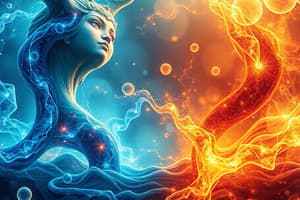Podcast
Questions and Answers
What is oxidation?
What is oxidation?
- The loss of electrons (correct)
- The transfer of electrons
- The gain of electrons
- The balance of GSH/GSSG
What is a reducing agent?
What is a reducing agent?
- A substance that has the ability to reduce other substances
- A substance that causes reduction by donating electrons (correct)
- A substance that has the ability to oxidize other substances
- A substance that causes oxidation by accepting electrons
What is the difference between an oxidant and a reductant?
What is the difference between an oxidant and a reductant?
- Oxidants and reductants are not used in redox reactions
- Oxidants and reductants are the same thing
- Oxidants are substances that have the ability to oxidize other substances, while reductants have the ability to reduce other substances (correct)
- Oxidants are substances that have the ability to reduce other substances, while reductants have the ability to oxidize other substances
What are electropositive elemental metals?
What are electropositive elemental metals?
What is the role of standard electrode potentials in redox reactions?
What is the role of standard electrode potentials in redox reactions?
What is the oxidation state of an element?
What is the oxidation state of an element?
What is the use of mnemonics in studying oxidation and reduction?
What is the use of mnemonics in studying oxidation and reduction?
What is the role of redox reactions in biological processes?
What is the role of redox reactions in biological processes?
What is the redox state?
What is the redox state?
Flashcards
Redox Reaction
Redox Reaction
A type of chemical reaction where atoms gain or lose electrons, changing their oxidation states.
Oxidation
Oxidation
The process of an atom losing electrons, increasing its oxidation state.
Reduction
Reduction
The process of an atom gaining electrons, decreasing its oxidation state.
Oxidizing Agent
Oxidizing Agent
Signup and view all the flashcards
Reducing Agent
Reducing Agent
Signup and view all the flashcards
Oxidation State
Oxidation State
Signup and view all the flashcards
Half-Reaction
Half-Reaction
Signup and view all the flashcards
Reduction Potential
Reduction Potential
Signup and view all the flashcards
Redox Reactions in Biology
Redox Reactions in Biology
Signup and view all the flashcards
Study Notes
Redox Reactions: Understanding Oxidation and Reduction
-
Redox is a type of chemical reaction in which the oxidation states of substrate change.
-
Oxidation is the loss of electrons or an increase in the oxidation state, while reduction is the gain of electrons or a decrease in the oxidation state.
-
The reductant transfers electrons to the oxidant in redox processes.
-
Oxidants are substances that have the ability to oxidize other substances, while reductants have the ability to reduce other substances.
-
Electropositive elemental metals such as lithium, sodium, and magnesium, are good reducing agents.
-
The electrochemist John Bockris proposed the words electronation and deelectronation to describe reduction and oxidation processes, respectively.
-
Rates of redox reactions can occur slowly, as in the formation of rust, or rapidly, as in the case of burning fuel.
-
Standard electrode potentials (reduction potentials) are used to measure the tendency of the oxidizing agent to be reduced.
-
Redox reactions are used in a wide variety of industries such as in the production of cleaning products and oxidizing ammonia to produce nitric acid.
-
Many important biological processes involve redox reactions, such as cellular respiration and photosynthesis.
-
The term redox state is often used to describe the balance of GSH/GSSG, NAD+/NADH and NADP+/NADPH in a biological system such as a cell or organ.
-
Electron transfer reactions are central to myriad processes and properties in soils and are governed by chemical reactions and biological processes.Understanding Oxidation and Reduction in Chemistry
-
Oxidation is the process of losing electrons, while reduction is the process of gaining electrons.
-
An oxidizing agent is a substance that causes oxidation by accepting electrons, while a reducing agent is a substance that causes reduction by donating electrons.
-
The oxidizing agent causes the oxidation of another substance, while the reducing agent causes the reduction of another substance.
-
The oxidation state of an element is the number of electrons it has gained or lost during a chemical reaction.
-
The transfer of electrons during oxidation and reduction reactions can be represented using half-reactions.
-
The oxidizing power of an oxidizing agent can be measured using its oxidation potential, while the reducing power of a reducing agent can be measured using its reduction potential.
-
The reactivity of metals in the periodic table can be explained in terms of their oxidation potentials.
-
Oxidation and reduction reactions are important in biological processes, such as cellular respiration and photosynthesis.
-
Oxidation and reduction reactions also play a role in corrosion, combustion, and many other chemical processes.
-
The terms "oxidation" and "reduction" come from the observation that oxygen gas was often involved in these types of reactions.
-
The use of mnemonics, such as "OIL RIG" and "LEO GER," can help students remember the terms and concepts associated with oxidation and reduction.
-
Understanding oxidation and reduction is important for students studying chemistry, biochemistry, and other related fields.
References:
- "Oxidation-Reduction Reactions." Chemistry LibreTexts, Libretexts, 2 July 2018, chem.libretexts.org/Bookshelves/General_Chemistry/Map%3A_Chemistry_-The_Central_Science(Brown_et_al.)/04._Reactions_in_Aqueous_Solution/4.5%3A_Oxidation-Reduction_Reactions.
- "Oxidation and Reduction Reactions." Khan Academy, Khan Academy, www.khanacademy.org/science/chemistry/oxidation-reduction.
Further Reading:
- "Oxidation-Reduction Reactions." Purdue University, Department of Chemistry, www.chem.purdue.edu/gchelp/howtosolveit/Electrochemistry/Redox_Reactions.htm.
- "Oxidation and Reduction." BBC Bitesize, BBC, www.bbc.co.uk/bitesize/guides/zq8bn39/revision/6.
External Links:
- "Oxidation and Reduction Reactions." Chem4Kids, www.chem4kids.com/files/react_redox.html.
- "Oxidation-Reduction Reactions." SparkNotes, www.sparknotes.com/chemistry/redox/oxidationreduction/.
Studying That Suits You
Use AI to generate personalized quizzes and flashcards to suit your learning preferences.




